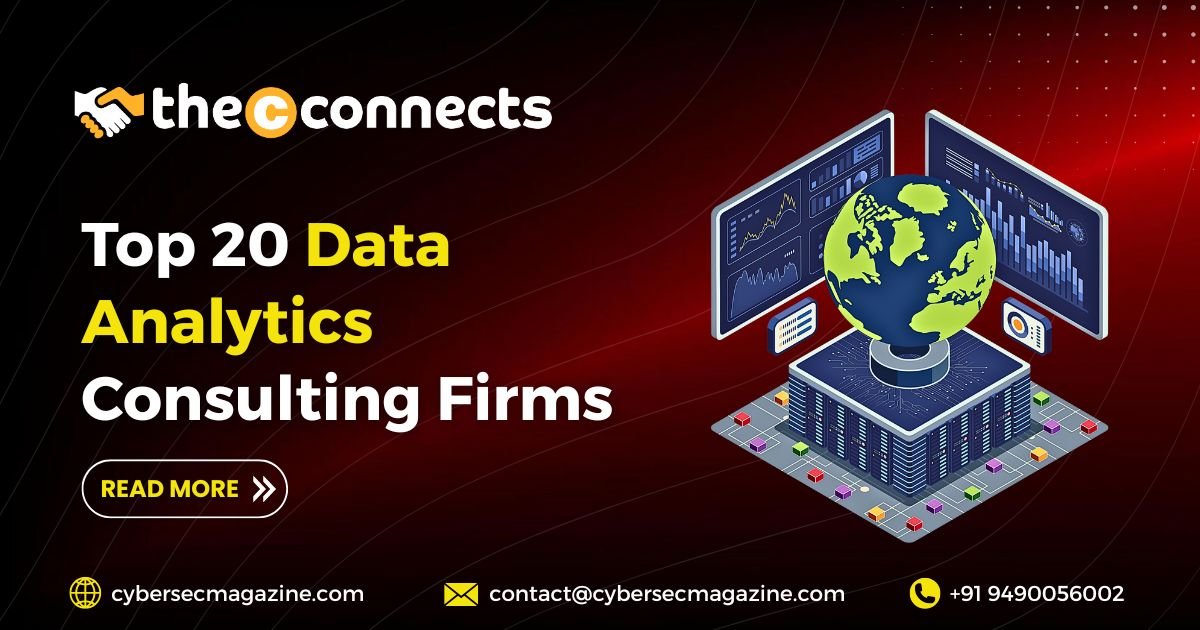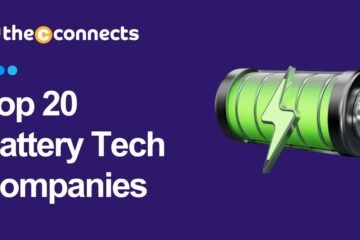Who’s Really Moving the Needle on AI, Insights, and Decision Intelligence
Below is an analyst-style rundown of 20 consulting firms that are shaping how enterprises use data -not just to build dashboards, but to change how they price, sell, operate, and innovate. For each firm you’ll get: founders, when they started, HQ, what they actually sell, a short strategic read, and the features that make them different.
1. McKinsey & Company
Company Name: McKinsey & Company
Founders: James O. McKinsey
Founded Year: 1926
Headquarters: New York City, New York, USA
Product Categories: Data & AI strategy, enterprise analytics operating models, digital transformation, AI/ML deployment through QuantumBlack.
About the Company :
McKinsey is widely seen as the gold standard in board-level problem solving, and over the last decade it has turned that influence into a serious AI and advanced analytics capability. The firm’s QuantumBlack unit (acquired by McKinsey in 2015) acts as its AI and data science engine, building production-grade machine learning systems and decision-intelligence platforms for clients in sectors like manufacturing, banking, pharma, and energy.
Key Features:
- QuantumBlack: specialized AI/ML teams embedded in industry workflows, not just labs.
- “Strategy + Build + Scale” model: they design top-down value targets, then wire analytics directly into frontline processes.
- IP-heavy accelerators for pricing, supply chain, fraud, churn, etc., refined across Fortune 500 use cases.
- Change management muscle -they don’t just deliver code, they redesign operating models.
- C-suite credibility: McKinsey can push analytics-driven decisions at board level and get buy-in fast.
2. Boston Consulting Group (BCG)
Company Name: Boston Consulting Group (BCG)
Founders: Bruce D. Henderson
Founded Year: 1963
Headquarters: Boston, Massachusetts, USA
Product Categories: AI strategy and deployment, digital/tech builds via BCG X, transformation programs, data-led performance improvement.
About the Company :
BCG has evolved from pure strategy into a hybrid strategy–engineering shop. Its BCG X division fuses product engineers, data scientists, and designers to build and scale AI products, data platforms, and decision-support systems -not just slide decks. BCG is aggressively positioning AI as recurring revenue, and has publicly stated that AI consulting is becoming a double-digit share of firm-wide revenue.
Key Features:
- BCG X: in-house builders for data platforms, custom software, and AI copilots.
- “Strategy → MVP → Scale” delivery motion in the same deal.
- Deep partnerships with hyperscalers and AI model providers to accelerate deployment.
- Quant-driven business cases for AI (cost takeout, growth levers, risk posture).
- Strong C-level narrative around responsible AI and sustainability-linked analytics.
3. Bain & Company
Company Name: Bain & Company
Founders: William W. (Bill) Bain Jr., Patrick F. Graham
Founded Year: 1973
Headquarters: Boston, Massachusetts, USA
Product Categories: Advanced analytics for revenue growth, loyalty and retention models, private equity value creation analytics, procurement/supply chain analytics.
About the Company :
Bain’s analytics work is tightly tied to outcomes executives actually care about: valuation, EBITDA expansion, commercial lift. The firm leans hard into “results, not reports,” building growth playbooks that are underpinned by customer-level, SKU-level, or channel-level analytics. Bain is also strong in private equity, where it uses data to pressure test deals, quantify operational upside, and accelerate post-close value creation.
Key Features:
- Revenue acceleration analytics (pricing, churn prediction, upsell scoring).
- PE diligence analytics: micro-market sizing, SKU profitability, whitespace mapping.
- Digital growth and personalization analytics for loyalty and CLV.
- Proprietary benchmarks from decades of transformation work.
- Embedded change teams to hardwire insights into sales, service, and ops.
4. Deloitte
Company Name: Deloitte (Deloitte Touche Tohmatsu Limited)
Founder: William Welch Deloitte
Founded Year: 1845
Headquarters: London, England, UK
Product Categories: AI and data modernization, risk analytics, finance and supply chain analytics, cloud transformation, sector-specific digital platforms.
About the Company :
Deloitte is the largest of the Big Four by revenue and headcount, and it has quietly turned that scale into a massive applied analytics machine. The firm ties AI, advanced analytics, cyber, tax data, and regulatory intelligence into large-scale business transformations -especially in finance modernization, supply chain resilience, compliance, and ESG reporting. With global delivery centers and industry playbooks, Deloitte’s analytics work aims at “run-the-business” change, not just pilots.
Key Features:
- Enterprise-grade governance: controls, auditability, compliance baked into data solutions.
- End-to-end delivery from board strategy to managed services.
- Strong digital risk and regulatory analytics (very attractive to regulated industries).
- Ability to scale globally in weeks via its member firms.
- Heavy AI investment, especially in generative AI for finance and operations.
5. Accenture
Company Name: Accenture plc
Founders: Originated as Andersen Consulting within Arthur Andersen; established as Andersen Consulting in 1989 before rebranding as Accenture.
Founded Year: 1989 (as Andersen Consulting)
Headquarters: Dublin, Ireland
Product Categories: Data & AI, cloud data platforms, analytics-driven process automation, digital core modernization, industry platforms.
About the Company :
Accenture is built to industrialize analytics at scale. With hundreds of thousands of consultants and engineers, the firm blends classic management consulting with large-scale systems integration, managed services, and proprietary accelerators for AI and data platforms. Accenture positions itself as the partner that can both design the analytics vision and actually stand up the data fabric, automate workflows, and run them globally. It also invests in creative and marketing analytics via acquisitions like Droga5, and in specialized tech ventures through joint initiatives like Avanade.
Key Features:
- “Strategy through run”: build, migrate, automate, and operate analytics in production.
- Deep partnerships with hyperscalers and SaaS ecosystems.
- Industry accelerators for insurance claims, telco network ops, retail demand sensing, etc.
- Massive managed services footprint for ongoing data ops.
- Ability to move fast on emerging tech through acquisitions and alliances (AI, genAI talent, creative analytics).
6. PwC (PricewaterhouseCoopers)
Company Name: PwC (PricewaterhouseCoopers International Limited)
Founders: Result of a 1998 merger between Price Waterhouse (Samuel Lowell Price, Edwin Waterhouse) and Coopers & Lybrand (William Cooper, others)
Founded Year: 1998 (modern form)
Headquarters: London, United Kingdom
Product Categories: Data, analytics & insights managed services, finance analytics, risk and compliance analytics, cloud data modernization, cyber & trust analytics.
About the Company :
PwC has repositioned itself from “audit + tax” to a data-enabled transformation partner. The firm’s consulting and managed services arms now build and operate data platforms, AI-enabled finance and supply chain processes, and risk/intelligence dashboards for heavily regulated industries. PwC is restructuring its advisory business around industry-specific platforms (front office, supply chain, cyber, cloud/data analytics) and embedding managed services so clients don’t just get strategy -they get ongoing analytics operations at scale.
Key Features:
- Industrialized managed services for analytics (talent + tooling + governance in one contract).
- Strong credibility with CFOs, CROs, and regulators.
- Heavy investment in AI-enabled compliance, tax intelligence, ESG disclosures.
- Global coverage across 150+ countries with sector-specific analytics playbooks.
- Ability to stand up secure data environments that satisfy audit-grade scrutiny.
7. EY (Ernst & Young / EY)
Company Name: EY (Ernst & Young Global Limited)
Founders: Formed from the 1989 merger of Ernst & Whinney and Arthur Young & Co. (their roots date to the 1800s via Alwin C. Ernst and Arthur Young)
Founded Year: 1989 (modern form)
Headquarters: London, England, UK
Product Categories: Data and AI strategy, finance transformation analytics, risk analytics, cybersecurity analytics, transaction analytics (through EY-Parthenon and Strategy & Transactions).
About the Company :
EY is positioning analytics as a board-level governance and value creation lever. The firm pairs compliance, transaction advisory, and sector expertise with digital, cloud, and AI delivery capabilities. EY emphasizes trust: building analytics systems that regulators, boards, and investors will actually sign off on. Its global network spans 150+ countries and ~390k professionals, giving it reach into complex, multi-jurisdictional transformation (tax, supply chain, finance, ESG).
Key Features:
- EY-Parthenon + data teams combine commercial strategy with analytics-heavy diligence.
- Strong in finance, tax, and regulatory data -areas where accuracy and auditability matter.
- Deep restructuring/transactions analytics for carve-outs, M&A, divestitures.
- Global operating model to deploy common data standards across dozens of countries.
- Active in AI governance, risk, and responsible-use frameworks.
8. KPMG
Company Name: KPMG International Limited
Founders: Formed by the 1987 merger of Klynveld Main Goerdeler (KMG) and Peat Marwick International (roots include William Barclay Peat and James Marwick)
Founded Year: 1987 (modern form)
Headquarters: London, England, UK (global network coordinated from London; large operational hubs include Amstelveen, Netherlands)
Product Categories: Data & AI (KPMG Lighthouse), risk analytics, financial crime analytics, ESG and regulatory reporting analytics, transformation advisory.
About the Company :
KPMG positions “Lighthouse” as its center of excellence for data-driven technology. The pitch: use analytics and AI to solve business problems with a “business-first” lens, then harden those solutions for audit, regulatory, and operational scrutiny. KPMG is especially strong where analytics, controls, and compliance intersect -think fraud, AML, ESG disclosure, and operational risk -and in turning those insights into digital transformation roadmaps for CFOs and CROs.
Key Features:
- KPMG Lighthouse: scalable AI/analytics platforms with governance built in.
- Advisory + Assurance DNA, so insights come with risk controls and audit trails.
- Strong play in regulatory analytics (financial services, ESG, cybersecurity).
- Cross-border delivery across 140+ countries.
- Focus on measurable business value, not just proofs of concept.
9. IBM Consulting
Company Name: IBM Consulting (formerly IBM Global Business Services)
Founders: IBM traces corporate roots to the 1911 Computing-Tabulating-Recording Company; IBM’s consulting arm originated in 1991 and was rebranded IBM Consulting in 2021.
Founded Year: 1991 (IBM’s dedicated consulting division); rebranded 2021
Headquarters: Armonk, New York, USA
Product Categories: Data & AI consulting, watsonx AI platforms, hybrid cloud modernization, intelligent workflows, automation.
About the Company :
IBM Consulting is built for data-heavy, mission-critical transformation. The firm helps enterprises modernize data estates, design AI governance, and operationalize generative/agentic AI through IBM’s watsonx portfolio. It leans on deep vertical IP (e.g. finance, telco, public sector) and pairs it with serious engineering chops in hybrid cloud and automation. IBM Consulting’s value prop is “do the right AI and do AI right”: make AI production-grade, secure, compliant, and scalable across global operations.
Key Features:
- watsonx: IBM’s enterprise AI/ML stack for building, governing, and scaling models.
- Strong in regulated industries and mission-critical workloads.
- Hybrid cloud + data fabric expertise (post-Red Hat acquisition strategy).
- AI governance, security, and auditability baked into delivery.
- Ongoing M&A to absorb niche AI/data startups and accelerate capability.
10. Capgemini
Company Name: Capgemini SE
Founder: Serge Kampf
Founded Year: 1967
Headquarters: Paris, France
Product Categories: Insights & Data (analytics/AI), Capgemini Invent (digital innovation and design), cloud data platforms, intelligent industry analytics.
About the Company :
Capgemini started in 1967 as a data processing and enterprise management firm and has scaled into a global IT and consulting powerhouse with deep analytics and AI capability. Its Insights & Data teams build data platforms, predictive models, and AI-driven process automation; Capgemini Invent focuses on digital strategy, experience design, and new business models. The firm excels at stitching analytics into legacy IT landscapes and complex industrial environments (manufacturing, automotive, energy).
Key Features:
- “Consult + Engineer + Operate” delivery model across cloud, data, and AI.
- Strong European presence in intelligent industry / Industry 4.0 analytics.
- Ability to modernize old ERP / OT / supply chain systems with analytics overlays.
- Capgemini Invent gives them upstream strategy and design credibility.
- Mature global delivery model for cost-effective scaling
11. Genpact
Company Name: Genpact Ltd.
Founder: Originally incubated inside General Electric under Pramod Bhasin
Founded Year: 1997 (as GE Capital International Services / GECIS)
Headquarters: New York City, New York, USA (legally domiciled in Bermuda; founded in Gurgaon, India)
Product Categories: Digital operations, process intelligence, advanced analytics for finance, supply chain, risk, customer experience, and AI-led automation.
About the Company :
Genpact grew up inside GE as a process excellence engine and turned that DNA into a standalone consulting/services business focused on digital operations and analytics. Today, it sells data-driven transformation: re-engineering finance, risk, and supply chain processes using analytics, AI, and automation -and then running those processes as managed services. Its strength is operational pragmatism: Genpact doesn’t just model outcomes, it rewires workflows, KPIs, and service levels to produce measurable efficiency and working capital impact.
Key Features:
- Deep process mining and “straight-through” digital operations expertise.
- Strong heritage in Six Sigma/Lean from GE, applied now with AI.
- Global delivery model for cost-effective analytics ops.
- Industry focus: finance, insurance, healthcare, manufacturing.
- Emphasis on continuous improvement, not one-off transformation.
12. Fractal (Fractal Analytics)
Company Name: Fractal (Fractal Analytics)
Founders: Srikanth Velamakanni, Pranay Agrawal (and co-founders)
Founded Year: 2000
Headquarters: Dual HQ in Mumbai, India and New York City, USA
Product Categories: AI advisory, decision intelligence platforms, computer vision, healthcare/life sciences analytics, CPG/retail analytics, specialized AI products (e.g. Qure.ai, Cuddle.ai).
About the Company :
Fractal brands itself as an “enterprise AI” partner: its mission is to power every decision in the enterprise using AI, analytics, and behavioral science. The firm builds and operationalizes AI solutions for consumer goods, financial services, healthcare, insurance, and retail, and has spun out productized offerings in areas like medical imaging (Qure.ai) and augmented decision-making dashboards (Cuddle.ai). Fractal has attracted significant investment and is viewed as one of the more mature AI-native consultancies preparing for IPO-scale capital markets visibility.
Key Features:
- Deep vertical AI IP (healthcare imaging, retail demand forecasting, insurance risk).
- “Decision intelligence,” not just dashboards -focus on human-in-the-loop decisions.
- Strong mix of data science + behavioral economics (inherited from acquisitions like Final Mile).
- Global talent base spanning India, US, UK.
- Aggressive innovation pipeline; treats AI as a product, not a project.
13. Mu Sigma
Company Name: Mu Sigma Inc.
Founder: Dhiraj Rajaram
Founded Year: 2004
Headquarters: Chicago, Illinois, USA
Product Categories: Decision sciences consulting, advanced analytics, experimentation-at-scale programs, data science talent-as-a-service.
About the Company :
Mu Sigma is one of the early pioneers of “decision sciences” -treating decision-making itself as an engineered discipline. The firm embeds multidisciplinary teams (math, business, behavioral science, design) inside large enterprises to drive continuous test–learn–scale cycles. Its model is less about one big AI program and more about creating an internal factory for rapid analytics experiments that improve pricing, marketing spend, fraud detection, and operations in near-real time. Mu Sigma has worked with a large share of the Fortune 500.
Key Features:
- “Art of Problem Solving System™”: a repeatable operating system for analytics-driven decisions.
- Large-scale analytics talent deployment model.
- Focus on experimentation velocity, not just model accuracy.
- Strong presence in marketing analytics, risk analytics, and ops optimization.
- Philosophy: analytics is a continuous capability, not a project.
14. Tiger Analytics
Company Name: Tiger Analytics
Founder: Mahesh Kumar
Founded Year: 2011
Headquarters: Santa Clara, California, USA (global delivery footprint including India)
Product Categories: AI/ML engineering, demand forecasting, supply chain analytics, customer analytics, computer vision, and custom AI accelerators/“open IP” building blocks.
About the Company :
Tiger Analytics positions itself as an AI-first consulting partner for practical, high-value use cases -think supply chain resilience, personalized marketing at scale, dynamic pricing, intelligent quality control, and field operations optimization. The firm differentiates with reusable, modular AI “accelerators,” which act like Lego blocks to get clients from use case idea to working prototype quickly, then scale it. Tiger emphasizes measurable business clarity: every model should translate into a visible lever (cost, revenue, risk).
Key Features:
- Industry accelerators for retail/CPG, supply chain, manufacturing.
- Strong in applied machine learning and computer vision.
- “Open IP” approach: clients keep insight and capability, not just slides.
- Founder-led culture focused on high-touch delivery and domain depth.
- Fast path from PoC to production, especially in data-rich environments.
15. LatentView Analytics
Company Name: LatentView Analytics
Founders: Venkat Viswanathan, Pramad Jandhyala (and early co-founders)
Founded Year: 2006
Headquarters: Princeton, New Jersey, USA (significant presence in Chennai, India, plus global offices)
Product Categories: Digital analytics, data engineering, marketing and customer analytics, financial analytics, AI/ML solutions for digital transformation.
About the Company :
LatentView is best known for helping large enterprises turn raw digital exhaust -clickstreams, transactions, behavioral signals -into growth decisions. The firm’s sweet spot is digital-native and data-rich businesses (tech platforms, consumer brands, fintech) that need fast, granular insight on acquisition, retention, pricing, and product usage. With delivery hubs in India and client engagement teams in the US and Europe, LatentView offers an attractive “follow the sun” analytics model that balances strategic advisory with hands-on data engineering.
Key Features:
- Very strong in marketing analytics, customer segmentation, and digital growth levers.
- Mature offshore/nearshore analytics operating model for cost efficiency.
- Focus on rapid insight cycles for product, pricing, and retention teams.
- Deep experience in consumer internet and high-velocity transactional data.
- Strong storytelling around “data-to-action,” not just “data-to-insight.”
16. ZS (formerly ZS Associates)
Company Name: ZS
Founders: Andris (Andy) Zoltners, Prabhakant (Prabha) Sinha
Founded Year: 1983
Headquarters: Evanston, Illinois, USA
Product Categories: Commercial analytics for life sciences, go-to-market analytics, territory alignment and salesforce optimization tools, patient and provider analytics.
About the Company :
ZS started when two Northwestern University professors used advanced math to optimize sales territories. That quantitative DNA remains core. Today ZS is one of the most respected analytics consultancies in life sciences and healthcare, using data to shape launch strategy, market access, patient adherence programs, and field force deployment. It’s increasingly product-led: analytics platforms, forecasting tools, and AI-driven recommendation engines for commercial and medical teams.
Key Features:
- #1 specialty: life sciences commercialization analytics (pricing, access, field force).
- Deep industry data models and benchmarks.
- Strong quantitative rigor rooted in operations research.
- Scalable global delivery network across 30+ offices.
- Product mindset: not just advice, but recurring analytics platforms.
17. Axtria
Company Name: Axtria
Founders: Jaswinder (Jassi) Chadha (and co-founders including Navdeep Chadha / Amit Jain referenced in public materials)
Founded Year: 2010
Headquarters: Berkeley Heights, New Jersey, USA
Product Categories: Cloud-based commercial analytics platforms for life sciences, sales performance management, omni-channel marketing analytics, patient journey analytics.
About the Company :
Axtria focuses almost exclusively on life sciences. Its value proposition: unify commercial data (field activity, marketing touchpoints, patient access hurdles, payer dynamics) and use AI/ML to guide what action the next best rep, marketer, or support team should take. Axtria positions itself as a “products-led services company”: yes, they consult, but they also run cloud software that operationalizes targeting, incentive compensation, and omnichannel orchestration for pharma and biotech.
Key Features:
- Specialization: end-to-end commercial analytics in pharma/biotech.
- Packaged cloud platforms for sales ops, targeting, next-best-action.
- Compliance-aware data handling for regulated pharma data flows.
- Strong executive leadership with deep life sciences heritage.
- Scalable global delivery with onshore/nearshore/offshore mix.
18. EXL Service
Company Name: EXL Service (ExlService Holdings, Inc.)
Founders: Vikram Talwar, Rohit Kapoor
Founded Year: 1999
Headquarters: New York City, New York, USA
Product Categories: Data analytics and AI for insurance, healthcare, banking/financial services; digital operations/outsourcing; intelligent automation.
About the Company :
EXL positions itself at the intersection of analytics and digital operations. Historically known for insurance and back-office process outsourcing, EXL has leaned hard into analytics and AI, using proprietary data models and automation to improve claims, care management, policy servicing, revenue cycle, and customer ops. The firm is actively reshaping its workforce and leadership to double down on AI-first delivery, elevating analytics leads into top operating roles and retooling its talent mix toward advanced data skills.
Key Features:
- Deep domain IP in insurance, healthcare, and BFSI.
- Strong managed services model (they’ll run the process, not just redesign it).
- Heavy pivot toward generative AI and intelligent automation at scale.
- Global delivery footprint (~50k+ people).
- Outcome-oriented commercial model tied to efficiency and accuracy.
19. Slalom
Company Name: Slalom, Inc. (Slalom Consulting)
Founders: Brad Jackson, John Tobin, Troy Johnson
Founded Year: 2001
Headquarters: Seattle, Washington, USA
Product Categories: Cloud and data modernization, AI and advanced analytics use cases, customer/marketing analytics, digital experience analytics, modern data platforms.
About the Company :
Slalom is a high-growth consulting firm built around modern cloud data stacks. It focuses on standing up analytics platforms in months, not years -often using hyperscaler-native tooling -and then using those platforms to drive customer experience, personalization, and operational insights. Unlike legacy firms that operate as global partnerships, Slalom markets itself as “fiercely human”: local teams with deep client intimacy plus global centers of excellence for AI, data engineering, and experience design.
Key Features:
- Cloud-native data platform builds and migrations.
- Fast cycle from prototype dashboard to production-grade analytics product.
- Strong collaboration model with in-house client teams (joint squads).
- Human-centered design + data science to shape digital experiences.
- Regional delivery model that keeps consulting teams close to the customer.
20. Palantir Technologies
Company Name: Palantir Technologies Inc.
Founders: Peter Thiel, Alex Karp, Joe Lonsdale, Stephen Cohen, Nathan Gettings
Founded Year: 2003
Headquarters: Denver, Colorado, USA
Product Categories: Data integration platforms (Gotham, Foundry, Apollo, AIP), AI-enabled decision intelligence for defense, national security, critical infrastructure, and complex commercial operations.
About the Company :
Palantir is not a traditional consultancy -it’s a software company with an embedded consulting model. The firm deploys platforms like Gotham (intelligence/defense), Foundry (enterprise data integration and analytics), Apollo (deployment/ops), and AIP (AI platform) alongside on-site teams that co-build use cases with clients. Palantir’s roots are in counterterrorism and intelligence analytics, but it now sells AI-driven operational decision systems to airlines, healthcare networks, manufacturers, and even front-line military programs. Demand for Palantir’s AI stack has surged, driving aggressive revenue forecasts.
Key Features:
- Opinionated software stack: data integration, governance, analytics, and AI in one layer.
- Embedded deployment teams that configure “mission control” apps fast.
- Strong traction in defense, aerospace, critical infrastructure, and increasingly commercial ops (airlines, retailers, logistics).
- Focus on real-time operational decisions, not just BI.
- Clear narrative around AI for national competitiveness and industrial resilience.
Final Takeaway
If you look across these 20 firms, a pattern jumps out:
- The line between “consulting” and “software” is gone. BCG X, QuantumBlack at McKinsey, watsonx at IBM, Axtria’s commercial cloud products, Palantir’s Foundry/AIP -everyone now sells some combination of advice + platform + managed outcome.
- Industry depth is now more valuable than generic analytics skill. ZS owns life sciences field force analytics. Axtria owns pharma commercialization analytics. Genpact and EXL own ops analytics in finance/insurance/healthcare. Tiger Analytics and Latent View specialize in high-velocity digital and data-rich environments.
- Governance, compliance, and auditability have become differentiators. That’s where Deloitte, PwC, EY, and KPMG keep winning: they can promise regulators, boards, and auditors that AI won’t blow up the firm.
Bottom line: picking a data analytics consulting partner in 2025 is less about “who can build a model?” and more about “who can build a data-driven operating system for my business -and stand behind it when the CFO, regulator, or battlefield commander starts asking tough questions.”



